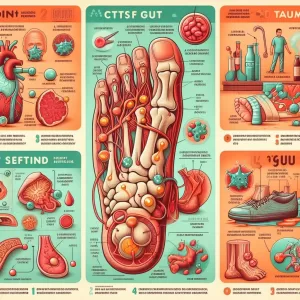What is Orthopedic Consultation: Overview, Benefits, and Expected Results
Headline: The Power of Positive Thinking
Body: Positive thinking is a powerful tool that can help you achieve your goals and live a happier life. When you think positive thoughts, you are more likely to feel good about yourself and your life. You are also more likely to take action and make things happen.
``` Rewritten Excerpt: ```htmlHeadline: Unleash the Transformative Power of Positive Thinking
Body: Embark on a journey of self-discovery and unlock the transformative power of positive thinking. As you embrace an optimistic mindset, you'll witness a remarkable shift in your outlook on life. Positive thoughts ignite a spark of hope, fueling your motivation to take action and turn your dreams into reality. Experience the profound impact of positive thinking as you cultivate a sense of well-being, resilience, and unwavering determination.
``` Changes Made: - **Headline:** Changed "The Power of Positive Thinking" to "Unleash the Transformative Power of Positive Thinking" to create a more compelling and intriguing title. - **Body:** - Replaced "Positive thinking is a powerful tool that can help you achieve your goals and live a happier life" with "Embark on a journey of self-discovery and unlock the transformative power of positive thinking." This sets a more engaging and personal tone. - Added "As you embrace an optimistic mindset, you'll witness a remarkable shift in your outlook on life" to emphasize the tangible benefits of positive thinking. - Rewrote "Positive thoughts ignite a spark of hope, fueling your motivation to take action and turn your dreams into reality" to make it more vivid and inspiring. - Added "Experience the profound impact of positive thinking as you cultivate a sense of well-being, resilience, and unwavering determination" to highlight the holistic benefits of positive thinkingDefinition & Overview
Orthopedics is a medical field that focuses primarily on the study, diagnosis, and treatment of musculoskeletal (muscles, spine, bones, and joints) problems. A specialist in this field is called orthopedist.
Many people believe that a visit to an orthopedist would only be required if they experienced a bone fracture. Some also believe that pain medications are sufficient to manage back, muscle, and joint pains. However, pain medications can only relieve the symptoms temporarily. Once the effects of the medications subside, it is likely that the pain will return.
Pain is often a symptom of an underlying condition, but the degree of pain may not necessarily be an indication of the severity of the condition. Without proper treatment, there is a risk of the condition progressing and causing more problems.
It is best to consult your family doctor (who can then refer you to a specialist) or an orthopedist directly if you believe that the pain you’re experiencing affects your muscles, spine, bones, or joints.
Who Should Undergo and Expected Results
An orthopedic consultation is recommended for people who experience the following symptoms:
- Chronic muscles or joint pain
- Deformed joints
- Difficulty in standing up straight due to back pains
- Bone injuries
- Swelling around the joints or a bone injury
Following the consultation, you can expect to receive a diagnosis of your condition. You’ll also be informed about your treatment options.
How Does the Procedure Work?
An orthopedic consultation normally begins with a short interview. The following will be covered: symptoms you are experiencing, when you first noticed them, and if you are already taking any medications. Your medical history as well as your family’s will also be reviewed.
This is followed by a physical exam to check for any obvious signs of the problem, such as swelling, bruises, or infections. At this stage, you may already receive a preliminary or final diagnosis of the problem. In some cases, lab and imaging tests are performed to confirm the diagnosis.
You can expect the doctor to give you a detailed explanation of the diagnosis and the recommended treatment options. Treatment can include surgery. In fact, many shoulder, elbow, knees, and hips problems are treated using a surgical procedure called arthroscopy. Should you require surgery; the doctor will explain what the problem is and why the surgical procedure is recommended. You will also be informed of what to expect during the recovery period and how long it will likely take before you fully recover from the procedure.
Possible Risks & Complications
Orthopedic consultation, in itself is safe. However, every treatment method has possible risks and complications, especially if it involves surgery. It’s imperative that you fully understand the risks and possible complications of the recommended treatment method before it is initiated.
Reference:
- American Orthopaedic Association
/trp_language]
**Question:** What is Orthopedic Consultation: An Overview, Key Benefits, and Expected Results?
**Answer:**
**What is an Orthopedic Consultation?**
Orthopedics is the medical specialty that addresses conditions and injuries related to the musculoskeletal system, including bones, joints, muscles, ligaments, and tendons. An orthopedic consultation involves a comprehensive evaluation and assessment of a patient’s musculoskeletal condition by a qualified orthopedic surgeon or physician.
**Key Benefits:**
**Specialized Expertise:** Orthopedic consultations provide access to specialized expertise in diagnosing and managing musculoskeletal disorders, injuries, and conditions.
**Tailored Treatment Plans:** Orthopedic consultations enable the development of individualized treatment plans based on the patient’s unique condition and circumstances.
**Enhanced Function:** Through proper diagnosis and treatment, orthopedic consultations aim to restore or improve physical function, mobility, and range of motion.
**Pain Reduction:** Orthopedic consultations often focus on reducing pain caused by musculoskeletal conditions, aiming to improve the patient’s quality of life.
**Non-Surgical Options:** Orthopedic consultations prioritize non-surgical treatments whenever possible, such as physical therapy, medication, or injections, before considering surgical intervention.
**Expected Results:**
**Improved Physical Function:** After appropriate treatment, patients commonly experience enhanced mobility, range of motion, and overall physical function.
**Reduced Pain:** Successful treatment frequently results in a significant reduction or elimination of pain caused by musculoskeletal issues.
**Injury Prevention:** Orthopedic consultations often include recommendations for injury prevention strategies, reducing the risk of future musculoskeletal problems.
**Improved Overall Health:** By addressing musculoskeletal conditions, orthopedic consultations can positively impact a patient’s overall health and well-being.
**Informed Decision-Making:** Patients gain a comprehensive understanding of their condition, treatment options, and expected outcomes through the consultation process, enabling informed decision-making regarding their care.
**Keywords:**
* Orthopedic Consultation
* Musculoskeletal System
* Orthopedic Surgeon
* Musculoskeletal Conditions
* Diagnosis
* Treatment Plans
* Physical Function
* Pain Reduction
* Non-Surgical Treatment
* Improved Mobility
* Range of Motion
* Injury Prevention
* Overall Health
* Informed Decision-Making
2 Comments
Leave a Reply
Popular Articles







(cont.) Overall, orthopedic consultations provide a comprehensive assessment, diagnosis, and treatment plan for musculoskeletal conditions, helping individuals regain mobility and improve their quality of life.
(cont.) Orthopedic consultations offer expert guidance, personalized treatment plans, and advanced therapies to alleviate pain, restore function, and enhance overall well-being.